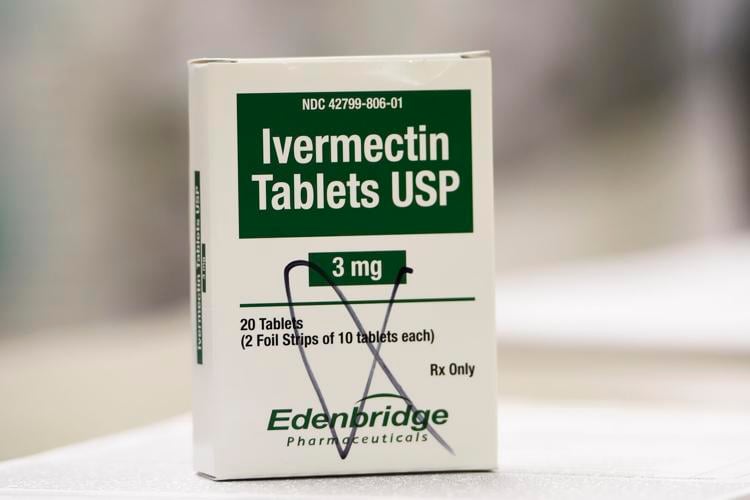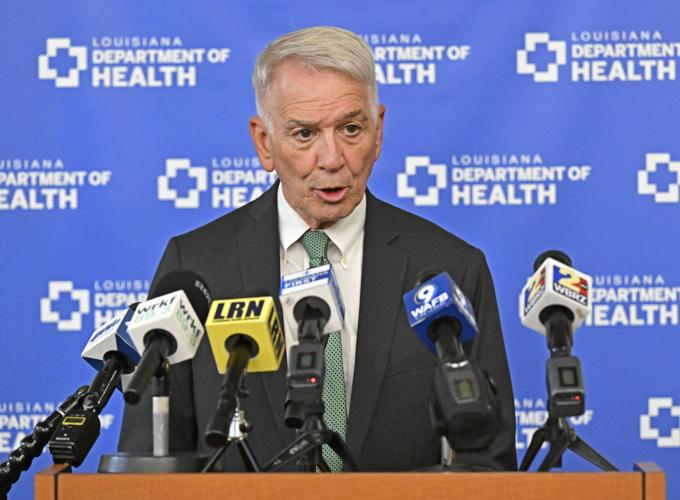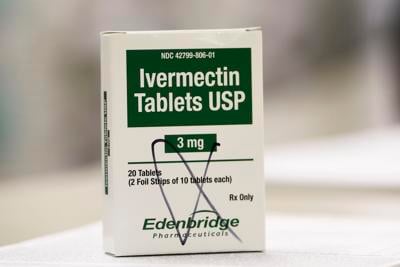Dr. Jon Mizrahi remembers learning about ivermectin in medical school. A powerful anti-parasitic, the drug was approved to treat specific infections in humans and was widely used in animals, particularly horses and livestock.
But that was the last he'd heard of it until his gastrointestinal cancer patients began asking for it during the COVID-19 pandemic.
Now, he fields requests for ivermectin constantly in his practice as a cancer specialist. Over two weeks this spring, more than half of Mizrahi’s new patients asked about the drug. Some hoped to combine it with chemotherapy. Others planned to take it instead.
Two patients had to delay chemotherapy because ivermectin elevated their liver enzymes. One patient, newly diagnosed with late-stage cancer, wanted to try ivermectin before chemo or radiation. Two months later, that person's cancer had gotten significantly worse.
Soon, more patients in Louisiana could have easier access to ivermectin, which oncology doctors worry could increase use of a drug that hasn’t been studied for cancer and could cause harm or interact poorly with proven treatments. Senate Bill 19, authored by Sen. Michael "Big Mike" Fesi, R-Houma, would authorize pharmacists in Louisiana to dispense ivermectin under a standing order without requiring a prescription from a patient’s physician.
The bill passed the Senate in April. On Wednesday, lawmakers on the House Health and Welfare Committee lawmakers voted 10-1 to advance the bill. It now goes to the Legislative Bureau to check for compliance with legislative rules, and then will be scheduled for the House floor. If it passes, it will go to Gov. Jeff Landry's desk. It would be effective immediately if signed into law.

Sen. Michael Fesi, R-Houma, in the senate chamber during legislative session, Wednesday, April 23, 2025, at the Louisiana State Capitol in downtown Baton Rouge, La.
“It will make people think that there is scientific and medical validity to it, and there's not,” said Mizrahi, who is based in New Orleans.
Mizrahi is one of dozens of cancer specialists in Louisiana raising concerns about the bill. In a letter signed by 40-plus providers and the Cancer Advocacy Group of Louisiana and Louisiana Oncology Society, opponents emphasized that standard cancer treatments such as chemotherapy, radiation, and immunotherapy are grounded in rigorous clinical trials, while ivermectin lacks research. It’s also not clear what dangers could come of combining ivermectin and another anti-parasitic drug, fenbendazole.
Supporters, however, say access is an issue of medical freedom and that by removing the stigma associated with taking ivermectin, patients could be more forthcoming and get the proper dosage, which is dependent on weight. Dr. Ralph Abraham, Louisiana’s surgeon general, has testified multiple times in support of making ivermectin available without a prescription.

Surgeon General of the Louisiana Department of Health, Dr. Ralph Abraham, speaks during a press conference, Monday, April 21, 2025, at the Louisiana Department of Health in Baton Rouge, La.
“I can pretty much assure you, if you asked 10 of your friends, one or two of them are probably taking ivermectin on a periodic or a daily basis,” Abraham said during the House committee meeting. A lot of people are getting it from veterinary supply stores, he said.
“I prefer it available in a human form, so that as a physician, I can have a conversation with my patient where they don't feel embarrassed or they won't hide something,” Abraham said.
The drug has seen a surge in off-label use due to internet-fueled claims that it can treat a number of conditions or even cure cancer.
Although ivermectin is effective against parasites — so much so that its developers won the Nobel Prize in 2015 — large studies have shown no significant benefit for COVID treatment, and ongoing research on its potential role in cancer remains preliminary, limited to cell and animal models. Experts caution that early promise in preclinical trials rarely translates into effective therapies in humans.
In January, actor Mel Gibson said on “The Joe Rogan Podcast” that three friends with Stage 4 cancer got better after taking ivermectin and fenbendazole.
“After that, I got more questions than I had ever gotten,” Mizrahi said.
Other oncologists reported similar trends. Dr. James Ellis, a New Orleans-based general oncologist, said he now hears about ivermectin from patients two to three times a week. He said allowing patients access to ivermectin without evidence of safety or benefit would breach the standard of care, amounting to malpractice if a patient had a bad outcome.
"We practice evidence-based medicine, and there's just no evidence for ivermectin in the diseases where it's being touted," Ellis said.
Dr. Mary Maluccio, a surgical oncologist specializing in rare cancers in New Orleans, hears about it upwards of a dozen times a week. Two of her patients died of liver failure after adding ivermectin to their regimen without informing the care team. The patients had cancers requiring aggressive chemotherapy that put their livers at risk anyway — but Maluccio suspects ivermectin contributed to the swift pace of decline.
For many cancer patients, experimenting with holistic remedies — green tea, turmeric, smoothies — is a way to feel some control. Maluccio doesn’t fault them for it. But ivermectin, she said, isn’t just a harmless add-on. Patients have referred to ivermectin as a “supplement,” she said, like it’s a vitamin.
“This is not crunchy granola,” Maluccio said. “This is not someone taking 18 pills of Coenzyme Q or turmeric or adding ginger to everything they eat.”
For patients facing advanced or rare cancers, the desire to try anything can be understandable, she said. But it becomes difficult to treat cancer with proven methods if a drug without known interactions is added to the mix, or there is no protocol for how taking it might impact surgery.
“We are not shooting down anything,” Maluccio said. “It is an FDA-approved medication. It is just not FDA-approved for the case you are sitting here and asking my advice about.”
The only lawmaker on the House committee to vote no, Rep. Tehmi Jahi Chassion, D-Lafayette, questioned how pharmacists could safely dispense a drug for off-label use without a clear diagnosis.
"We were misled during the COVID era, and that's where all this comes from," said Fesi, the bill’s sponsor. "As a free people, I know we can make our own decisions on what we want to do."




